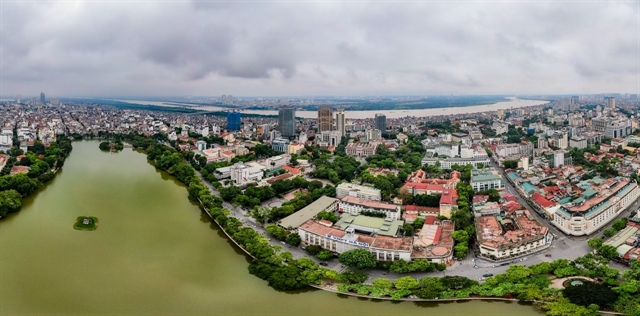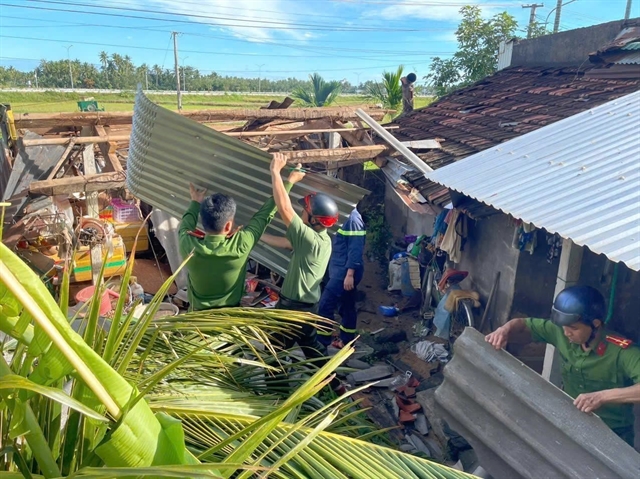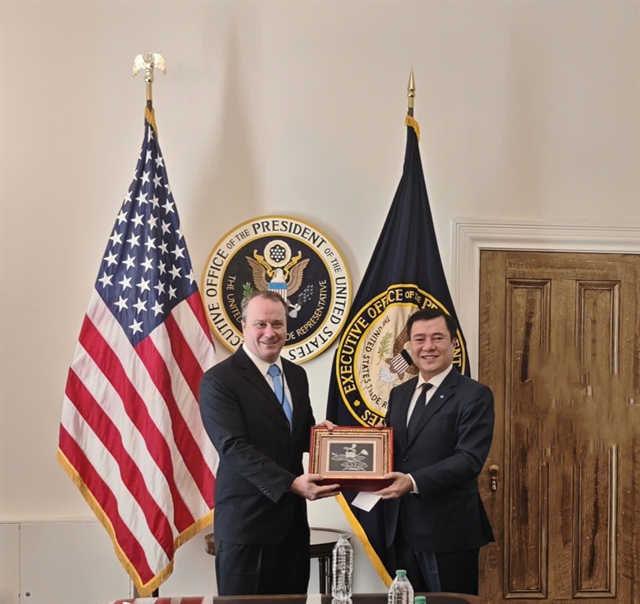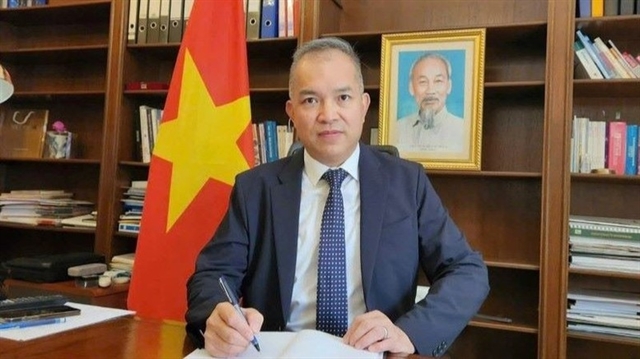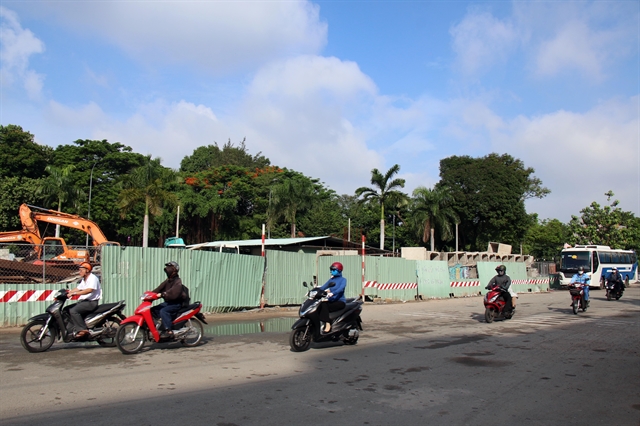

Teenage football players in the Central Highlands have a special man as their coach. He is from Nigeria in West Africa, but now lives in Viet Nam having married into a local family.
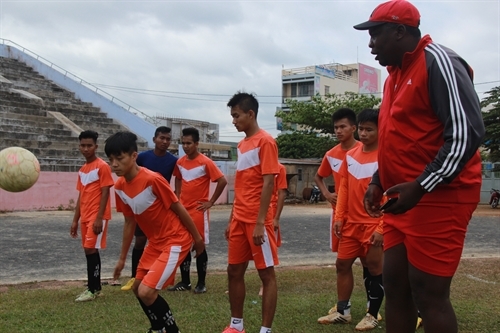 |
| Gridiron gang: Iliya Buba (right) seen in a training session with the U17 team. Photo Thái Thịnh |
Teenage football players in the Central Highlands have a special man as their coach.
He is from Nigeria in West Africa, but now lives in Viet Nam having married into a local family.
Iliya Buba decided that he wanted to offer something to the province of Đắk Lắk, which is where his wife is from.
He is not only coaching people football. He is also making it possible for football players to learn English.
by Thanh Nga
Over the last year, football fans in the Central Highlands province of Đắk Lắk have often seen a foreign man warming up in the early afternoon and preparing training tools for footballers at Buôn Ma Thuột Stadium.
This man is Iliya Buba, 33, from Nigeria. Buba is the chief coach of the U17 team and has volunteered to train the provincial team.
“I volunteer for the U17 team because football has no age limit in coaching," Buba said. "A coach is always a coach, what matters is how you compose yourself, believe in your God, believe in yourself, believe in your players and believe in your employees. I took the job first because it’s my wife’s province, I need to contribute to the community. I am happy with it because the players are responding to my training positively."
At 2 pm every weekday, Buba’s footballers are at the stadium. They stand in two lines and start their practice under the guidance of Buba and two Vietmamese assistants.
“Buba is a strict coach, but he always creates conditions for his players to prove themselves," said Nguyễn Phi Hà of U17 team. "He is always on time and hates slowness. He often gets to the stadium early and is the last person leaving the field."
Buba is not just interested in training footballers on the field. He also cares about his players’ lives. He often goes to the Đắk Lắk Sports Training Centre at night to visit footballers’ rooms and talk with them.
“Buba lives sentimentally. When a footballer is sick, he pays a visit every day and buys extra medicine for him," said Hà’s teammate, Hà Anh Sơn. "He also takes us to go swimming and watch football on the weekend."
The biggest obstacle with Buba is language. To overcome this difficulty, he co-ordinated with his friend to open an English class for footballers every Saturday. He focuses on teaching football language so they can understand him.
“Thanks to Buba, the U17 team have better physical strength, spirit and tactics. He passed his passion for football on to all of his players,”said Võ Thành Danh, director of Đắk Lắk Sports Training Centre.
Under the guidance of Buba, the team hope they will do well at the coming National U17 Football Championship.
Passion for sport
“I love football with passion. There is nothing that you can do to take me away from football or any thing that concerns football,” Buba said.
When Buba was 11 years old, he made a small football pitch in the compound that his family lived in. He planted grass for six months and it became the best pitch in his community. Adults and children used to come and beg to play with him. He organised inter-street tournaments, and it became a yearly activity until his family moved away.
Buba started his professional football career in 2001 for Udoji United in Anambra State in Nigeria, a Premier League team.
“I played very well so I received a number of offers from other clubs, and I signed with Elkanemi Academy Warriors, also a premier league team,” he said. “I had the opportunity to train for the World Cup in South Korea and Japan in 2002, but was not able to play because of the high level of corruption in Nigeria – essentially, each player needed to have a ‘godfather’ to pay off the coaches. This was not possible for me.
"I was there because I was a good footballer, but could not progress and play for my country because I didn’t have a rich family. As a result of this experience, I understand how football should be managed in order to assure fairness to the players, especially those from developing countries.”
Buba has been to 24 countries for training, courses and seminars about football before coming to play in Việt Nam in 2005. He played for Tây Ninh and then the Nam Định first division club.
While competing with his club in Nha Trang in the southern province of Khánh Hòa, he met and married Nguyễn Nhất Đan Thanh, a girl from Đắk Lắk Province.
In 2010, Buba set up Buba FC, which aims to provide opportunities for players based on their talent, hard work and skill, and aims to ensure that FIFA will recognise the team and its players should they need legal support.
In 2013, he suffered a severe injury while playing and had to end his career.
Although he hasn’t played football professionally, his passion for football is always in his heart. He chose his wife’s native land of Đắk Lắk to settle and bought an apartment near the provincial sports training centre to follow sport activities conveniently.
When Buba watched the provincial U15 team, he was deeply impressed by the team’s powerful playing style.
“The team played very enthusiastically," he said. "When I was small, I also played like that. I liked them very much and wanted to train with them."
He decided to take the AFC’s ‘B’ and ‘C’ Coaching Certificatecourse held in the southern province of An Giang in 2013. After that, he returned to Đắk Lắk and volunteered to coach the U17 team.
“I wish I would coach Việt Nam’s national team someday and Việt Nam would qualify for the world cup," Buba said. VNS
GLOSSARY
Over the last year, football fans in the Central Highlands province of Đắk Lắk have often seen a foreign man warming up in the early afternoon and preparing training tools for footballers at Buôn Ma Thuột Stadium.
A foreign man is a man from another country.
Buba is the chief coach of the U17 team and has volunteered to train the provincial team.
To volunteer to do something means to offer to do it free of charge. In other words, for no payment.
"A coach is always a coach, what matters is how you compose yourself, believe in your God, believe in yourself, believe in your players and believe in your employees.
To compose yourself means to be in control of yourself including the way that you look and the way that you speak and the way that you act.
Your employees are people who work for you.
The biggest obstacle with Buba is language.
An obstacle is something that gets in your way when you are trying to get something done.
To overcome this difficulty, he co-ordinated with his friend to open an English class for footballers every Saturday.
To overcome a difficulty means to win over it.
By co-ordinating an English class, Buba organised with different people to make it possible for the classes to happen.
“Thanks to Buba, the U17 team have better physical strength, spirit and tactics.
Tactics are carefully planned actions.
He passed his passion for football on to all of his players,”said Võ Thành Danh, director of Đắk Lắk Sports Training Centre.
If you have a passion for something it means that you love it so much you do not even notice the hard work it may involve and you will not worry if it costs money to do.
He organised inter-street tournaments, and it became a yearly activity until his family moved away.
An inter-street tournament is a tournament in which the teams represent different streets.
Buba started his professional football career in 2001 for Udoji United in Anambra State in Nigeria, a Premier League team.
People who have professional football careers play the game as a job. They are paid to play.
“I played very well so I received a number of offers from other clubs, and I signed with Elkanemi Academy Warriors, also a premier league team,” he said.
A premier league is the group of the very top teams in a country that play against one another.
“I had the opportunity to train for the World Cup in South Korea and Japan in 2002, but was not able to play because of the high level of corruption in Nigeria – essentially, each player needed to have a ‘godfather’ to pay off the coaches.
An opportunity means a chance to do something
As a result of this experience, I understand how football should be managed in order to assure fairness to the players, especially those from developing countries.”
To assure fairness means to make sure there will be fairness.
Developing countries are those that are on their way out of being poor and without things such as schools, good roads and factories in even the smallest and most faraway places but are heading towards getting them there.
In 2010, Buba set up Buba FC, which aims to provide opportunities for players based on their talent, hard work and skill, and aims to ensure that FIFA will recognise the team and its players should they need legal support.
Talent is natural skill.
FIFA is the organisation that is in charge of world football and events such as the World Cup.
If FIFA recognises a team, it accepts it to be one that could be good enough to try things such as qualifying for the World Cup and the Asia Games.
Legal support means help from a lawyer.
He chose his wife’s native land of Đắk Lắk to settle and bought an apartment near the provincial sports training centre to follow sport activities conveniently.
If something is convenient, it fits in with your plans.
When Buba watched the provincial U15 team, he was deeply impressed by the team’s powerful playing style.
To be impressed by the team means to think highly of them because of what you see they are able to do.
“The team played very enthusiastically," he said.
To play enthusiastically means to play with enthusiasm. That is to want to enjoy and want to play.
WORKSHEET
State whether the following sentences are true, or false:
© Duncan Guy/Learn the News/ Viet Nam News 2016
1. False; 2. True; 3. False; 4. True; 5. True.

